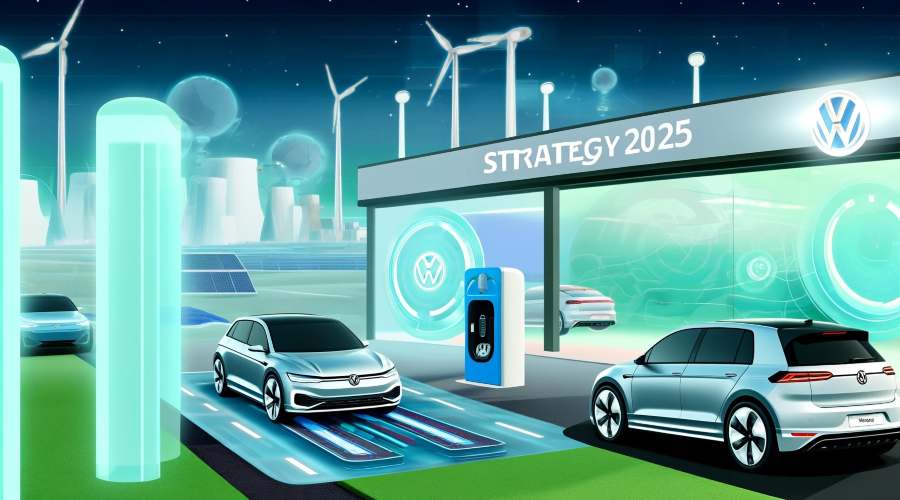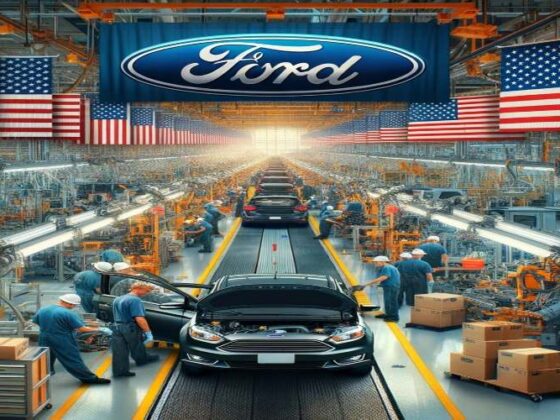Volkswagen Strategy 2025 represents a bold vision for the future, aiming to transform the automotive giant into a global leader in sustainable and innovative mobility solutions. As the world shifts towards cleaner and smarter transportation, Volkswagen’s ambitious plan focuses on electrification, digitalization, and expanding its mobility services. This strategy not only addresses the growing environmental concerns but also positions Volkswagen at the forefront of the automotive industry’s digital revolution. In this article, we will delve into the key aspects of Volkswagen Strategy 2025, examining how it plans to achieve its goals and the impact it will have on the industry and consumers alike.
What Is Volkswagen Strategy 2025?
Volkswagen Strategy 2025 is an ambitious plan aimed at transforming the company into a global leader in sustainable and innovative mobility solutions. It focuses on electrification, digitalization, and expanding mobility services, addressing environmental concerns and positioning Volkswagen at the forefront of the automotive industry’s digital revolution.
The Vision Behind Volkswagen Strategy 2025
Volkswagen Strategy 2025 is not just a business plan but a comprehensive vision for the future of mobility. The strategy encompasses several key pillars that guide Volkswagen’s transformation journey. Central to this vision is the commitment to sustainability, innovation, and customer-centric solutions. Volkswagen aims to reduce its carbon footprint significantly by shifting towards electric vehicles (EVs) and implementing environmentally friendly production processes. Additionally, the strategy includes the development of autonomous driving technologies and connected car services, enhancing the overall driving experience and ensuring safety and convenience for users. By embracing these cutting-edge technologies, Volkswagen aims to lead the automotive industry into a new era of mobility.
Volkswagen’s ambitious goals include launching over 30 electric models by 2025, aiming for electric vehicles to account for 25% of its total sales. This shift towards electrification is crucial in reducing greenhouse gas emissions and meeting global environmental targets. Furthermore, Volkswagen is investing heavily in battery technology and infrastructure to support the widespread adoption of EVs. By developing its battery production facilities, Volkswagen ensures a reliable supply of high-quality batteries, which are essential for the performance and longevity of electric vehicles.
In addition to electrification, Volkswagen Strategy 2025 focuses on digitalization. The company plans to integrate advanced digital technologies into its vehicles and operations, enhancing connectivity and user experience. This includes the development of smart mobility solutions, such as ride-sharing and on-demand transport services, which cater to the evolving needs of urban populations. By offering a range of mobility services, Volkswagen aims to provide seamless and convenient transportation options for consumers, reducing the reliance on traditional car ownership.
How Volkswagen Plans To Achieve Its Goals?
Volkswagen Strategy 2025 outlines a comprehensive approach to transforming the company into a leader in sustainable and innovative mobility. Here’s how Volkswagen plans to achieve its ambitious goals:
1. Electrification of the Vehicle Fleet
- Introduction of Electric Models: Volkswagen plans to launch over 30 electric models by 2025. This includes a wide range of electric vehicles (EVs), from compact cars to SUVs, catering to diverse consumer needs and preferences.
- Sales Targets: The company aims for electric vehicles to constitute 25% of its total sales by 2025. This ambitious target reflects Volkswagen’s commitment to electrification and reducing its environmental impact.
- Battery Technology and Infrastructure: Significant investments are being made in battery technology and infrastructure. Volkswagen is focusing on developing high-performance, long-lasting batteries and establishing a network of charging stations to support EV adoption.
- In-House Battery Production: To ensure a reliable supply of batteries, Volkswagen is developing its battery production facilities. This vertical integration will help control quality, reduce costs, and secure the supply chain for EV batteries.
2. Advancements in Autonomous Driving
- Research and Development: Volkswagen is conducting extensive research and development to advance autonomous driving technologies. This includes the development of sensors, software, and algorithms necessary for self-driving vehicles.
- Partnerships: To accelerate progress, Volkswagen is forming partnerships with technology companies and research institutions. These collaborations bring in expertise and innovation, speeding up the deployment of autonomous driving systems.
- Testing and Deployment: Autonomous vehicles are being tested in controlled environments to ensure safety and reliability. Volkswagen is working closely with regulatory bodies to meet safety standards and obtain necessary approvals for public road deployment.
- Safety and Compliance: Ensuring the safety of autonomous vehicles is paramount. Volkswagen is implementing rigorous testing protocols and safety measures to meet regulatory requirements and gain consumer trust.
3. Digital Transformation
- Connected Car Services: Volkswagen is integrating advanced digital technologies into its vehicles, offering connected car services that enhance the driving experience. These services include real-time navigation, remote diagnostics, and over-the-air updates.
- Smart Mobility Solutions: Volkswagen is developing smart mobility solutions such as ride-sharing, car-sharing, and on-demand transport services. These solutions cater to the changing needs of urban populations, providing flexible and convenient transportation options.
- Data-Driven Decision Making: Leveraging big data and analytics, Volkswagen is optimizing its operations and improving customer experience. Data-driven insights help in making informed decisions, enhancing efficiency, and delivering personalized services.
Why Sustainability Is A Core Focus
1. Environmental Responsibility
Volkswagen is committed to addressing the urgent environmental challenges facing our planet. The automotive industry is a major contributor to greenhouse gas emissions, and as a leading player, Volkswagen has a responsibility to mitigate its environmental impact. By focusing on sustainability, Volkswagen aims to:
- Reduce Greenhouse Gas Emissions: Transitioning to electric and hybrid vehicles significantly reduces the carbon footprint of Volkswagen’s vehicle fleet. The company is also implementing renewable energy sources in its production facilities, further cutting down emissions.
- Promote Clean Energy: Volkswagen is investing in renewable energy for its operations and for charging its electric vehicles. This not only reduces emissions but also supports the global shift towards sustainable energy sources.
- Support Environmental Conservation: By adopting sustainable practices, Volkswagen is contributing to the preservation of natural resources and the protection of ecosystems. This includes using recycled materials, minimizing waste, and optimizing resource efficiency in manufacturing processes.
2. Regulatory Compliance
- Emission Standards: Various countries and regions have set ambitious targets for reducing vehicle emissions. Volkswagen’s focus on electric vehicles helps meet these standards and positions the company as a compliant and responsible automaker.
- Sustainable Production Requirements: Regulations are also tightening around the sustainability of production processes. Volkswagen’s adoption of sustainable materials and waste reduction practices ensures compliance with these evolving standards.
- Consumer Expectations: Beyond regulatory compliance, consumers are becoming more environmentally conscious and demand sustainable products. By prioritizing sustainability, Volkswagen meets consumer expectations and strengthens its brand reputation.
3. Long-Term Business Viability
- Future-Proof the Business: The shift towards electric and sustainable vehicles is inevitable. By leading this transition, Volkswagen ensures its relevance and competitiveness in the future automotive market.
- Innovate and Lead: Sustainability drives innovation in vehicle design, production processes, and business models. Volkswagen’s commitment to sustainability fosters innovation, enabling the company to lead the industry in new technologies and practices.
- Attract Investment: Investors are increasingly prioritizing environmental, social, and governance (ESG) criteria. Volkswagen’s focus on sustainability makes it an attractive investment option, securing funding for future growth and innovation.
When Will Volkswagen Strategy 2025 Take Full Effect?
Volkswagen Strategy 2025 is set to be implemented in several phases, with each phase targeting specific milestones and objectives. This comprehensive strategy is designed to transition Volkswagen into a leader in sustainable and innovative mobility solutions. Here’s a detailed timeline of when Volkswagen Strategy 2025 will take full effect:
1. 2020-2021: Initial Phases
During the initial phases, Volkswagen laid the groundwork for its Strategy 2025. Key activities in these years included:
- Introduction of Early Electric Models: Volkswagen began launching its first wave of electric vehicles (EVs), starting with the ID.3 and ID.4 models. These models set the stage for future EV development and market acceptance.
- Expansion of R&D Facilities: To support the strategy, Volkswagen expanded its research and development (R&D) capabilities, focusing on electric mobility, autonomous driving, and digital technologies.
- Strategic Partnerships: Volkswagen formed strategic partnerships with technology companies and suppliers to accelerate advancements in battery technology, autonomous driving, and digital services.
- Public Commitment to Sustainability: Volkswagen publicly committed to its sustainability goals, including reducing carbon emissions and transitioning to renewable energy sources.
2. 2022-2023: Mid-Term Progress
The mid-term phase focuses on scaling up production and enhancing technological capabilities. Key milestones during these years include:
- Scaling Up Battery Production: Volkswagen increased its investments in battery production facilities, aiming to secure a stable and high-quality supply of batteries for its electric vehicles. This includes the development of in-house battery production capabilities.
- Increased Production of Electric Vehicles: Volkswagen ramped up the production of electric vehicles, introducing more models and expanding its EV lineup. The goal is to achieve significant market penetration and meet the growing consumer demand for electric mobility.
- Expansion of Digital Services: Volkswagen enhanced its digital services and connectivity features, integrating advanced technologies into its vehicles to improve user experience and offer new mobility solutions.
3. 2024-2025: Final Implementation
The final phase focuses on achieving the core objectives of Volkswagen Strategy 2025 and fully integrating the planned innovations. Key milestones expected by 2025 include:
- Achievement of Sales Targets for Electric Vehicles: By 2025, Volkswagen aims for electric vehicles to constitute 25% of its total sales. This ambitious target reflects the company’s commitment to electrification and reducing its environmental impact.
- Full Integration of Autonomous Driving Technologies: Volkswagen plans to fully integrate autonomous driving technologies into its vehicle lineup, offering consumers safer and more convenient driving experiences. This includes the commercial deployment of self-driving cars in select markets.
- Enhanced Digital Ecosystem: The digital transformation of Volkswagen’s operations and vehicles will be complete, providing a connected and intuitive user experience. This includes real-time navigation, remote diagnostics, and over-the-air updates.
Conclusion
Volkswagen Strategy 2025 represents a transformative vision for the future of mobility, driven by sustainability, innovation, and digitalization. By focusing on electrification, autonomous driving, and digital services, Volkswagen aims to lead the automotive industry into a new era. The strategy not only addresses environmental challenges but also enhances the overall driving experience for consumers. As Volkswagen continues to implement its ambitious plan, the impact on the industry and society will be profound, setting new standards for sustainable and innovative transportation solutions.
FAQs
What Is Volkswagen Strategy 2025?
Volkswagen Strategy 2025 is a comprehensive plan aimed at transforming the company into a global leader in sustainable and innovative mobility solutions, focusing on electrification, digitalization, and expanding mobility services.
Why Is Sustainability Important In Volkswagen Strategy 2025?
Sustainability is crucial as it addresses environmental challenges, reduces greenhouse gas emissions, and promotes the use of renewable energy and sustainable production practices.
How Will Volkswagen Achieve Its Electrification Goals?
Volkswagen plans to launch over 30 electric models by 2025, invest in battery technology and infrastructure, and develop in-house battery production facilities to support the widespread adoption of electric vehicles.
What Are The Benefits Of Volkswagen’s Digital Transformation?
The digital transformation will enhance connectivity, user experience, and smart mobility solutions, providing consumers with advanced features and convenient transportation options.
When Will Volkswagen Strategy 2025 Be Fully Implemented?
The strategy will be implemented in phases, with significant milestones expected by 2025, including the launch of electric models, scaling up battery production, and full integration of autonomous driving technologies.










